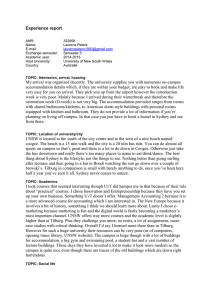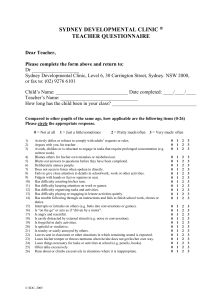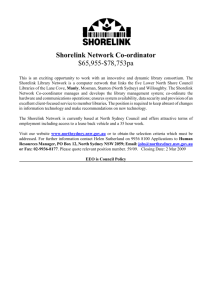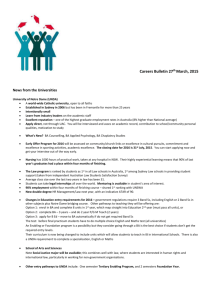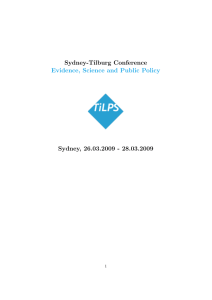GUIDELINES FOR WRITING THE EXPERIENCE REPORT
advertisement
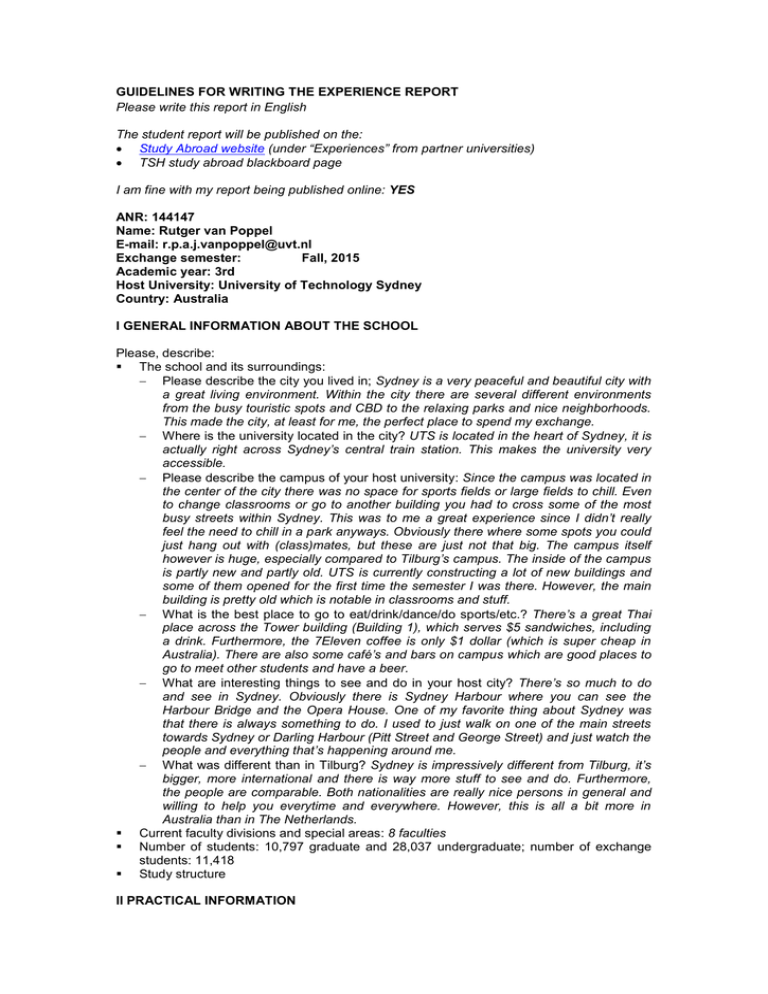
GUIDELINES FOR WRITING THE EXPERIENCE REPORT Please write this report in English The student report will be published on the: Study Abroad website (under “Experiences” from partner universities) TSH study abroad blackboard page I am fine with my report being published online: YES ANR: 144147 Name: Rutger van Poppel E-mail: r.p.a.j.vanpoppel@uvt.nl Exchange semester: Fall, 2015 Academic year: 3rd Host University: University of Technology Sydney Country: Australia I GENERAL INFORMATION ABOUT THE SCHOOL Please, describe: The school and its surroundings: Please describe the city you lived in; Sydney is a very peaceful and beautiful city with a great living environment. Within the city there are several different environments from the busy touristic spots and CBD to the relaxing parks and nice neighborhoods. This made the city, at least for me, the perfect place to spend my exchange. Where is the university located in the city? UTS is located in the heart of Sydney, it is actually right across Sydney’s central train station. This makes the university very accessible. Please describe the campus of your host university: Since the campus was located in the center of the city there was no space for sports fields or large fields to chill. Even to change classrooms or go to another building you had to cross some of the most busy streets within Sydney. This was to me a great experience since I didn’t really feel the need to chill in a park anyways. Obviously there where some spots you could just hang out with (class)mates, but these are just not that big. The campus itself however is huge, especially compared to Tilburg’s campus. The inside of the campus is partly new and partly old. UTS is currently constructing a lot of new buildings and some of them opened for the first time the semester I was there. However, the main building is pretty old which is notable in classrooms and stuff. What is the best place to go to eat/drink/dance/do sports/etc.? There’s a great Thai place across the Tower building (Building 1), which serves $5 sandwiches, including a drink. Furthermore, the 7Eleven coffee is only $1 dollar (which is super cheap in Australia). There are also some café’s and bars on campus which are good places to go to meet other students and have a beer. What are interesting things to see and do in your host city? There’s so much to do and see in Sydney. Obviously there is Sydney Harbour where you can see the Harbour Bridge and the Opera House. One of my favorite thing about Sydney was that there is always something to do. I used to just walk on one of the main streets towards Sydney or Darling Harbour (Pitt Street and George Street) and just watch the people and everything that’s happening around me. What was different than in Tilburg? Sydney is impressively different from Tilburg, it’s bigger, more international and there is way more stuff to see and do. Furthermore, the people are comparable. Both nationalities are really nice persons in general and willing to help you everytime and everywhere. However, this is all a bit more in Australia than in The Netherlands. Current faculty divisions and special areas: 8 faculties Number of students: 10,797 graduate and 28,037 undergraduate; number of exchange students: 11,418 Study structure II PRACTICAL INFORMATION Information before you left When did you receive the pre-arrival information from the host university? April Any difficulties? No, just a lot of arranging which wouldn’t be different at another Univeristy I recon. Visa procedure and arrival How long did it take you to arrange your (student) visa (if relevant)? One day How much did you pay for the visa? 550 euro (I believe) How was your arrival organized? Great, the minute you checked in at the reception of UTS you where guided to your room and everything was set. Events were organized from day one, which was a great way to meet other students and eventual friends. Did someone pick you up from the airport/station? No, there was a UTS shuttle organized from and to the Airport but I came in late so it was not going anymore. How was the reception at the school? Good, nothing to complain about. Was the administration and faculty well prepared for your arrival? Yeah it was, no trouble with checking or anything. Nice welcome and good events organized. What problems, if any did you encounter? None Orientation/Introduction activities Was an orientation or introduction activity organized? Yeah, the first week was one big party week with events all day long, and some at night. This was perfect to meet other students and room mates. Did the school’s students participate in the reception of the exchange students? Yeah, some did. Only the ones who lived on campus as well. Did you have a student mentor/buddy? Yeah, within the UTS residents there were Resident Advisors who guided you and helped you whenever needed. Housing How was accommodation organized? Good, looked nice, nice people, clean and in the center of the city. So, nothing to complain. Did you have to book your accommodation in advance or did you have to search for a place to live after you arrived? Booking of housing was in advance. What kind of housing does the university provide? Several University Housing buildings which were separate from each other, but all close to the university. Like, 10 minute walk. What support did you receive from the school in locating housing? This all went through mail, so you knew before arriving where you would end up and you where brought to the resident with a shuttle bus. The shuttle bus drove everyday, all day long until 2am. Were you satisfied with your accommodation? Yes Any special issues or good ideas/useful websites for prospective students? No, you get everything mailed through once you need it. So just keep an eye on your mailbox. Living Costs How did you finance your exchange period, apart from the grant you received from Tilburg University? I saved a lot of money on before hand, from which I knew I was going to spend all on my exchange. Eventually I nearly spend all of it on my housing rent and the rest I spend on fun stuff, like travelling. Furthermore I started a student loan at the Dutch government one month before I left to Sydney, which covered my monthly costs. Sadly, I had to loan some more money from my parents for travelling and fun stuff. What were your living expenses abroad like compared to Tilburg? I spend way more money abroad, not just because you do a lot of touristic stuff, but also because living in Sydney is way more expensive then here. Like, a beer costs at least $8, which is insane compared to the Dutch prises. What did you spend most of your money on? Travelling and fun stuff, like partying, visiting cool places and daytrips. What would you advice future students to spend their money on? Travelling and fun stuff. Please outline your approximate monthly budget whilst on exchange: Housing: 625 euro a month Food: 200 euro Transport: 50 euro Books: none Miscellaneous: 200 euro Academic Calendar Arrival date & introductory week: 15 July. 17 July – 24 July First day of the semester? 27 July Last day of classes? 27 July Mid-term break? 25 September – 2 Octobre Examination period? November Any special events? Australian Day, 26th of January The International Office Is there an international office? Yeah, on campus in the main building. Who is responsible for incoming exchange students? UTS Housing Services. How does the international office function? The security visits every housing resident every few hours, and the big residents even have a reception which is open 24/7. The main reception at Yura is available 24/7 as well for questions and help. Are you satisfied with the information provided to you by the international office? Yes. Exchange promotion What kind of activity did you take part in to promote exchange to Tilburg University at your exchange university? Social Activities Which social activities are organized by the university/students for exchange students? Multiple organized UTS housing events like barbeques and parties. Is there a student organization for international student? Yes Did you have contact with local students? Yeah, some housemates of my were Australian Did you have contact with other exchange students? Yeah, a lot actually. Most of my housemates were exchange students. Did you travel to other places/countries during your exchange? Yeah, I travelled a lot in Australia and even went to New Zealand Culture and Language Did you experience culture shock while on exchange? How would you compare your host culture to your own culture? What did you learn about your own culture while on exchange? What was different about your host culture than you expected? How would you describe your host country’s culture? What did you like and not like about your host culture? Do you feel you learned a lot about your host culture, and if not, what would you like to learn more? If you travelled to other cities/countries during your exchange, were they different than your host city/country, and how? Did you have any language problems with the faculty or other students? Did you follow language courses during your exchange? Did you follow the Erasmus Intensive Language Course? Personal Development How do you think the exchange experience will affect you from a cultural and social point of view? How do you think the exchange experience will influence your future career possibilities? What did you learn from the people you met during your exchange? Would you do things differently if you had the chance, and what would you do differently? What was your best experience, and what was your worst experience? What will you never forget about your exchange period? What was the most important lesson you learned about yourself during your exchange period? III ACADEMIC INFORMATION Academic level at a host university In what language(s) are the courses offered at a partner university? Did you follow any courses taught in the language of the host country? Which courses did you take and why? Which courses would you recommend? How would compare the academic level at your host university to the academic level at Tilburg University (e.g.: level of the courses, use of extra material, level of English, workload, etc.)? Is the teaching style primarily practical or theoretical? What teaching method is practiced by the host university: case studies, group work, seminars or lectures (or a mix)? How would you describe the relationship between the students and the teaching staff? In general, were you happy with your academic achievements during your exchange? Exams What types of exams did you have to sit? Other Can students easily access the library and its resources? Were there public computers available on campus/in university buildings? Description of Courses Please list all courses you have taken at a partner university in the form below: Course title and code Course level (BA/MA) Prerequisites, if any Form of exam ECTS credits you have obtained in total: Comments: Relevance, Difficult/easy, Practical/theoretical, Enrolment problems Course Name Prerequisites Exam Major at TiU Ex: 1234 finance none Written Finance Please fill in all the courses you have taken Approved as (minor/ elective / extra) Elective Tips for the future students: Would you recommend an exchange period? Would you recommend your host university? What should prospective students absolutely not forget before going on exchange? How can they better prepare before going on exchange to this destination? Was there anything you should have arranged before departure that you haven’t? A picture is worth a thousand words If you took any pictures or made any videos that you would like to share with future exchange students, please include them (or e-mail them separately). Pictures that show your daily life or symbolize your exchange period are especially interesting for future exchange students. Blog If you kept a (photo) blog during your exchange that you would like to share (e.g.: www.waarbenjijnu.nl, www.blipfoto.com) with future exchange students, please let us know the URL. Contact details: Can the International Relations Office share your e-mail address with prospective exchange students, so that other students could contact you for more information? YES
